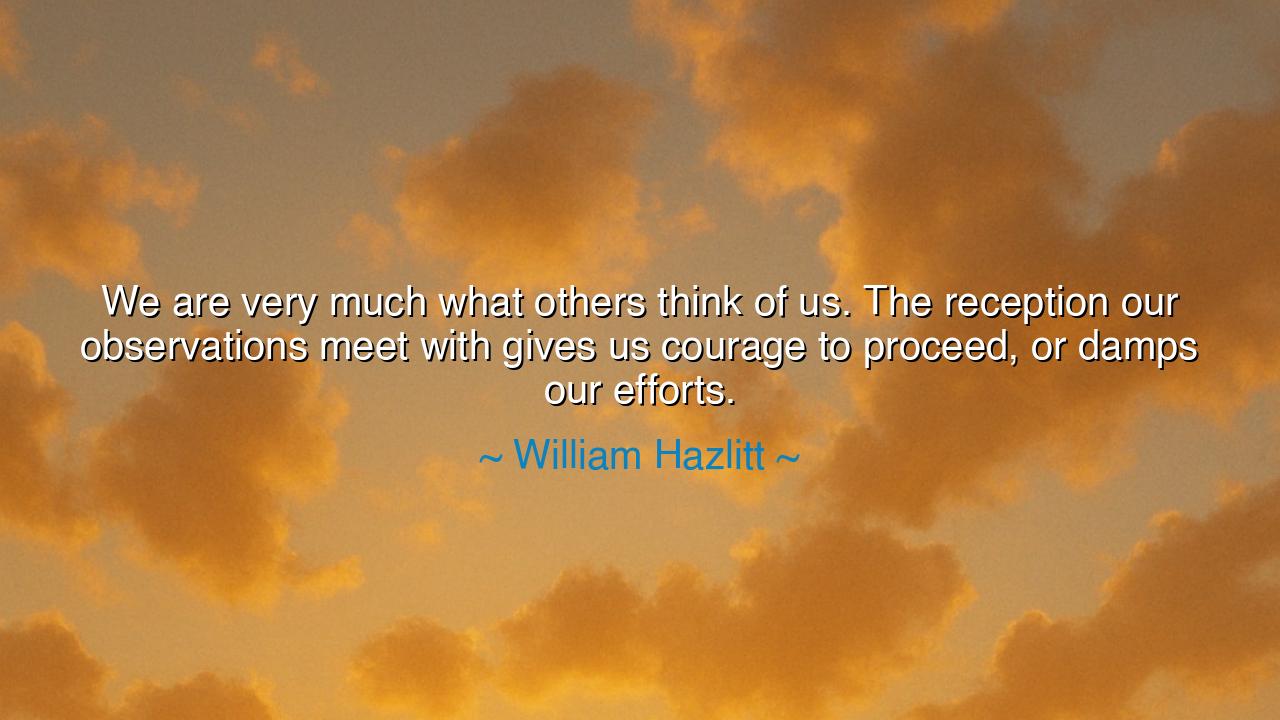
We are very much what others think of us. The reception our
We are very much what others think of us. The reception our observations meet with gives us courage to proceed, or damps our efforts.






The English essayist William Hazlitt, a man of fire and intellect, once declared: “We are very much what others think of us. The reception our observations meet with gives us courage to proceed, or damps our efforts.” In these words lies a piercing truth about the human heart—a truth as ancient as the first gatherings of humankind. For though we strive to be self-reliant, though we speak of independence and individuality, the soul remains a creature of reflection. It is shaped not only by its own light, but by the light—or shadow—cast upon it by others. Perception molds identity, and the warmth or chill of the world’s response can stir a man to greatness or bury his spirit in silence.
Hazlitt, born in the tumult of ideas and revolutions, knew well the fragile balance between self-belief and the world’s approval. He lived by his pen, and his words, though bold and brilliant, were often met with envy or disdain. From this pain he learned that even the strongest mind craves recognition, for it affirms the worth of its labor. The artist, the thinker, the dreamer—all are fed not only by conviction but by communion. When the world listens with respect, the flame of creation burns brighter; when it turns away in scorn, even the fiercest heart may falter. Thus Hazlitt spoke not as a cynic, but as a realist of the human soul: our courage to proceed depends often upon the echo that returns to us from others.
To deny this truth is to deny our nature. For man is not a solitary star; he is part of a constellation. His light shines brightest when it mingles with others, when it is seen and understood. Even the sages who retreated into deserts or mountains carried within them the hope that their wisdom might one day be received. The philosopher writes for unseen minds; the poet sings for unseen hearts. When their words are met with understanding, the spirit is exalted. When they are mocked or ignored, it sinks into doubt. Such is the delicate alchemy between expression and reception, between the inner voice and the outer world.
History bears witness to this truth. Consider Vincent van Gogh, the painter who poured his soul into color and form. In his lifetime, he was dismissed, ridiculed, left to wander the fields of Arles in loneliness. The reception of his art was cold, and so his spirit grew weary. Yet within him burned the same vision that later generations would revere as genius. Had he lived to see the world’s recognition, perhaps his heart would have found peace. His tragedy is not only the neglect of talent—it is the demonstration of Hazlitt’s insight: that the world’s response can either nurture creation or extinguish it.
And yet, Hazlitt’s words, though they expose our dependence, also call us to wisdom. If we are “what others think of us,” we must learn to guard our souls against the tyranny of opinion. The same voices that inspire can also enslave. To live entirely for the praise of others is to become a mirror without substance—reflecting, but never being. The wise therefore learn a sacred balance: to accept encouragement without surrender, to draw strength from others’ faith but not to let their scorn dictate one’s worth. True mastery lies in hearing the world, but not being ruled by it.
So what, then, shall the seeker do? First, know thyself—root your purpose in truth, not vanity. Yet do not despise the fellowship of praise; let the warmth of appreciation feed your resolve, and let criticism refine, not destroy, your craft. Seek the company of those who see you truly, for their belief will steady you when the world grows indifferent. And when the world turns away, remember that even the greatest minds were misunderstood before they were admired. The seed of greatness often lies buried in the soil of rejection.
In the end, Hazlitt reminds us that no soul stands alone. Our success, courage, and joy are woven from both the inner will and the outer echo. The heart that acts in solitude may begin the work, but the heart that is seen, heard, and valued will carry it to its highest bloom. So strive, O reader, to both give and receive this sacred recognition. Encourage those who labor in obscurity, and do not fear to seek encouragement yourself. For when our joy and others’ faith unite, we become, as Hazlitt foresaw, not mere echoes in the dark—but a chorus of courage, strong enough to move the world.






AAdministratorAdministrator
Welcome, honored guests. Please leave a comment, we will respond soon